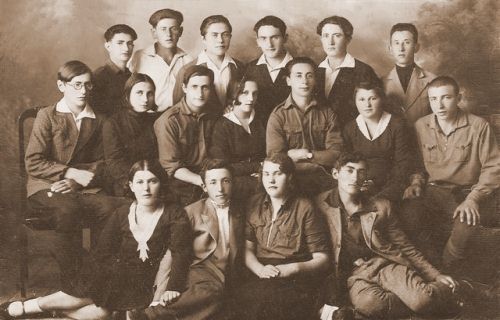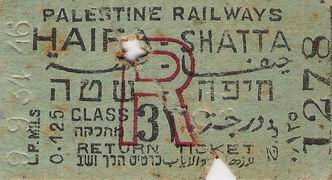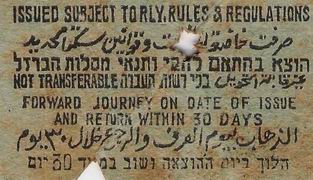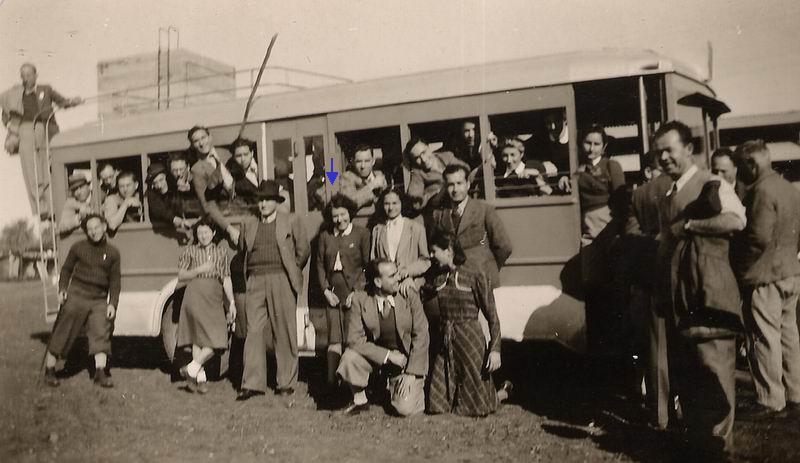[Pages 60]
Those Rocks Aroused our Imagination (cont.)
|
|
Members of the Hachshara at Kibbutz “Chaim” Panevezys, 1934
“Life there was very hard! …We didn't have what to live on. We truly went hungry…“
Top: Arye Gurwitz (extreme right), Micha Baron (second from left)
Second row: Nechama Patz (second from right), Sima Abelson-Baratz (middle)
Bottom: Miryam Slep (extreme left) |
I joined the hachshara of Hashomer Hatzair at Kibbutz Chaim[3] in Ponevez (Panevezys) where the hard times began… I only spent several months on hachshara, and life there was very hard! Not everyone had work, and we didn't have what to live on. We truly went hungry, but we were “stuffed to the gills” with Zionism…
Meir Yaari came as a shaliach (emissary) from Eretz Yisrael and told us about the land, and Yaacov Gottlieb also came.
Certificates[4] were hard to come by, and the only way around this was by means of fictitious marriages… Every such couple would receive a certificate along with a ketuba (Jewish marriage certificate).
Before making aliya, I came home to take my leave. I remember my father warning me not to leave my luggage unguarded… When we arrived in Berlin, the “gang” decided to wander through the streets, but I hesitated about leaving my luggage, and only half-heartedly went to tour the city without it…
Do I remember leaving home? I remember that they all escorted me. All my relatives came. It was a festive moment. In the movement they held a farewell party for me. [2]
First Encounter with a “Poel Yehudi” in Eretz Yisrael
On Purim 1934 I reached Jaffa port. Such a colorful port; the porters with their black turbans! They came out in boats to the ship anchored at a distance from the harbor, and from the boats they carried us to the shore on their backs. It was a very strange sight…
I stayed at the immigrant hostel in Jaffa for a few days, and from there I went to my brother Yosef in Ramat-Gan. I was walking in a lane when I suddenly saw a laborer in work clothes carrying a hoe, and I was all excited at my first encounter with a Poel Yehudi (Jewish laborer) in Eretz Yisrael. I asked him if he knew someone called Yavnai, and heard him say: “That's me.” I was so surprised!
Yosef had left the shtetl when I was still a little girl, and fourteen years had gone by since then, so it was no wonder that we did not recognize each other, especially since it was so unexpected…
I can't forget that moment of coming face to face with life in Eretz Yisrael: my first encounter with a Jewish worker, the scent of the citrus groves…
From there I went to Haifa and lived for a while in the home of the Zahavi family in the Nahla quarters (today Michael Street). Their home frequently absorbed new immigrants who would stay for a night or two, and then continue on their way…
I was fluent in Hebrew, and my beautiful handwriting roused admiration, so that I immediately found work in the Anglo-Palestine Bank (today Bank Leumi). I quickly realized that I was using very literary Hebrew. When I said “puzmeka'ot” (hosiery), they didn't understand me. In addition, when I said “zeh harah li,” they corrected me saying, “here we use 'it made me angry'.” I laugh now, as I did then, when they told me how funny I sounded[5].
In the shop they asked me where I was from, and I answered – and this also makes me laugh – “from the Diaspora...” I remember the shopkeeper responding: “We're still in the Diaspora, sitting between the British and the Arabs.” He told me that his ancestors had come from Lithuania, and as always, when Litvaks (Lithuanian Jews) meet, we immediately felt as though we were family.
… When I made aliya to Eretz Yisrael, I toured it extensively, and the fact that I saved a train ticket from the “Valley Train”[6], from September 9, 1934, is a sign that that was a special experience. [2]
|
|
|
|
Return Train ticket: Palestine Railways Haifa-Shatta L.P. Mils 0.125 |
|
|
Employees of the Anglo-Palestine Bank on “a trip to the [Jezreel] Valley”
January 8, 1941
Miryam is in a dark suit standing next to the middle door of the bus |
I think that the last letter I received from home was after the Russians entered Lithuania. The regime became a communist one (June 1940).
My sister Henia, who worked as a cashier in a mercantile enterprise in Rakishok (Rokiskis), became the 'boss', and the former bosses became her workers. [2]
Footnotes
- Passages from an interview with Miryam Slep conducted by Michal Gutmacher: Gutmacher, Michal, The Affinity of the Jews of Dusiat (Lithuania) to Eretz Yisrael, History Term Paper, The Hebrew Reali School, Haifa, March 1992, pp. 222-232 Return
- The Zionist movements had centers where young people trained for living and working on kibbutzim in Palestine. These training centers were called kibbutz hachshara and each one had its own name. Kibbutz Chaim in Ponevez was named after Chaim Arlozorov. Return
- British permits for immigration to Palestine. Return
- “Zeh harah li” is the Hebrew for “that aroused my ire”, harah sounds like the word for bodily waste in Arabic… Return
- This was a train established by the Ottomans, which went from Haifa, through the Jezreel Valley to Damascus. It was called the “Valley Train“ by the Jewish population, but this was never its official designation. Return
This material is made available by JewishGen, Inc.
and the Yizkor Book Project for the purpose of
fulfilling our
mission of disseminating information about the Holocaust and
destroyed Jewish communities.
This material may not be copied,
sold or bartered without JewishGen, Inc.'s permission. Rights may be
reserved by the copyright holder.
JewishGen, Inc. makes no representations regarding the accuracy of
the translation. The reader may wish to refer to the original material
for verification.
JewishGen is not responsible for inaccuracies or omissions in the original work and cannot rewrite or edit the text to correct inaccuracies and/or omissions.
Our mission is to produce a translation of the original work and we cannot verify the accuracy of statements or alter facts cited.
 Dusetos, Lithuania
Dusetos, Lithuania
 Yizkor Book Project
Yizkor Book Project
 JewishGen Home Page
JewishGen Home Page
Yizkor Book Director, Lance Ackerfeld
This web page created by Lance Ackerfeld
Copyright © 1999-2026 by JewishGen, Inc.
Updated 27 Sep 2009 by LA






